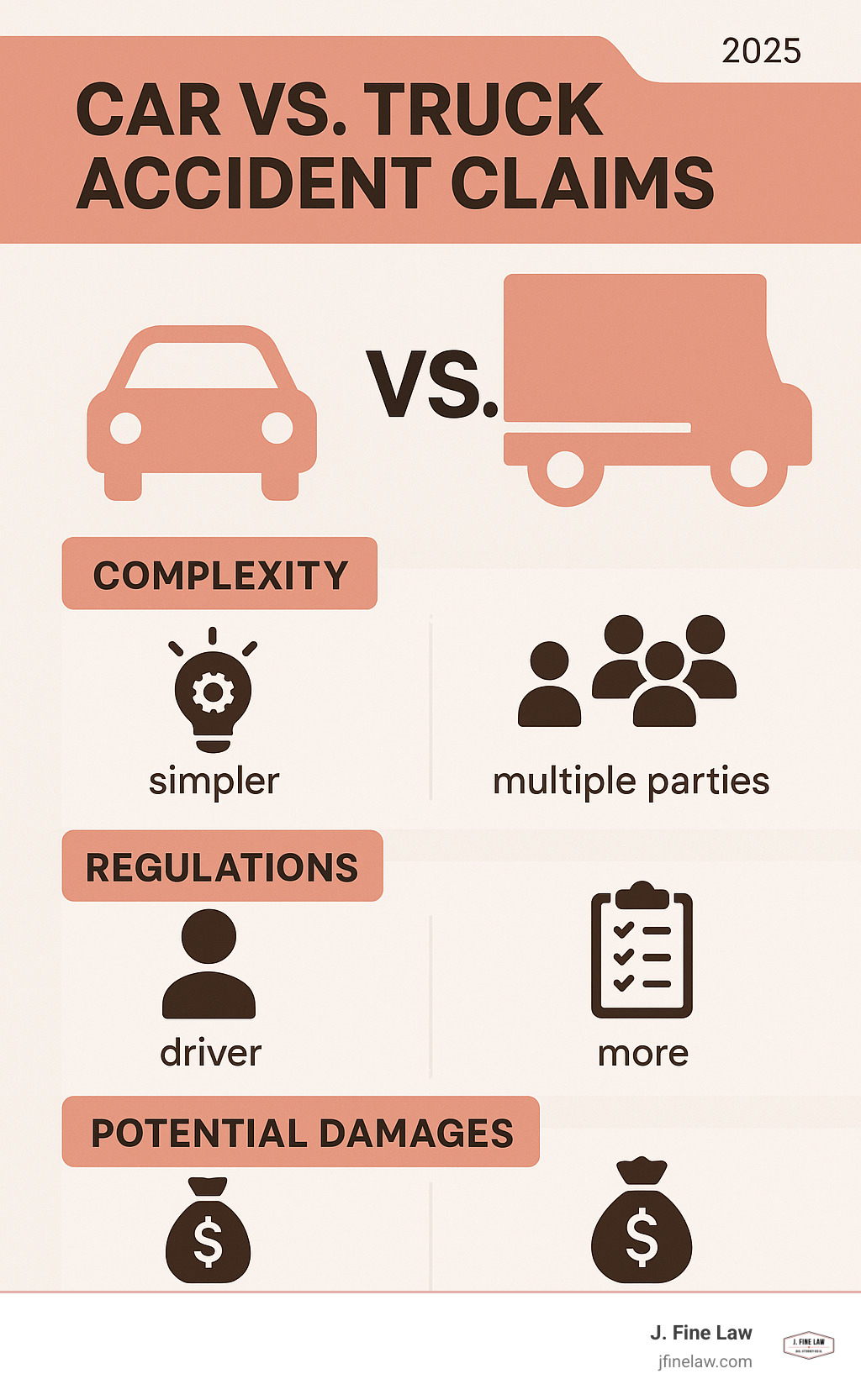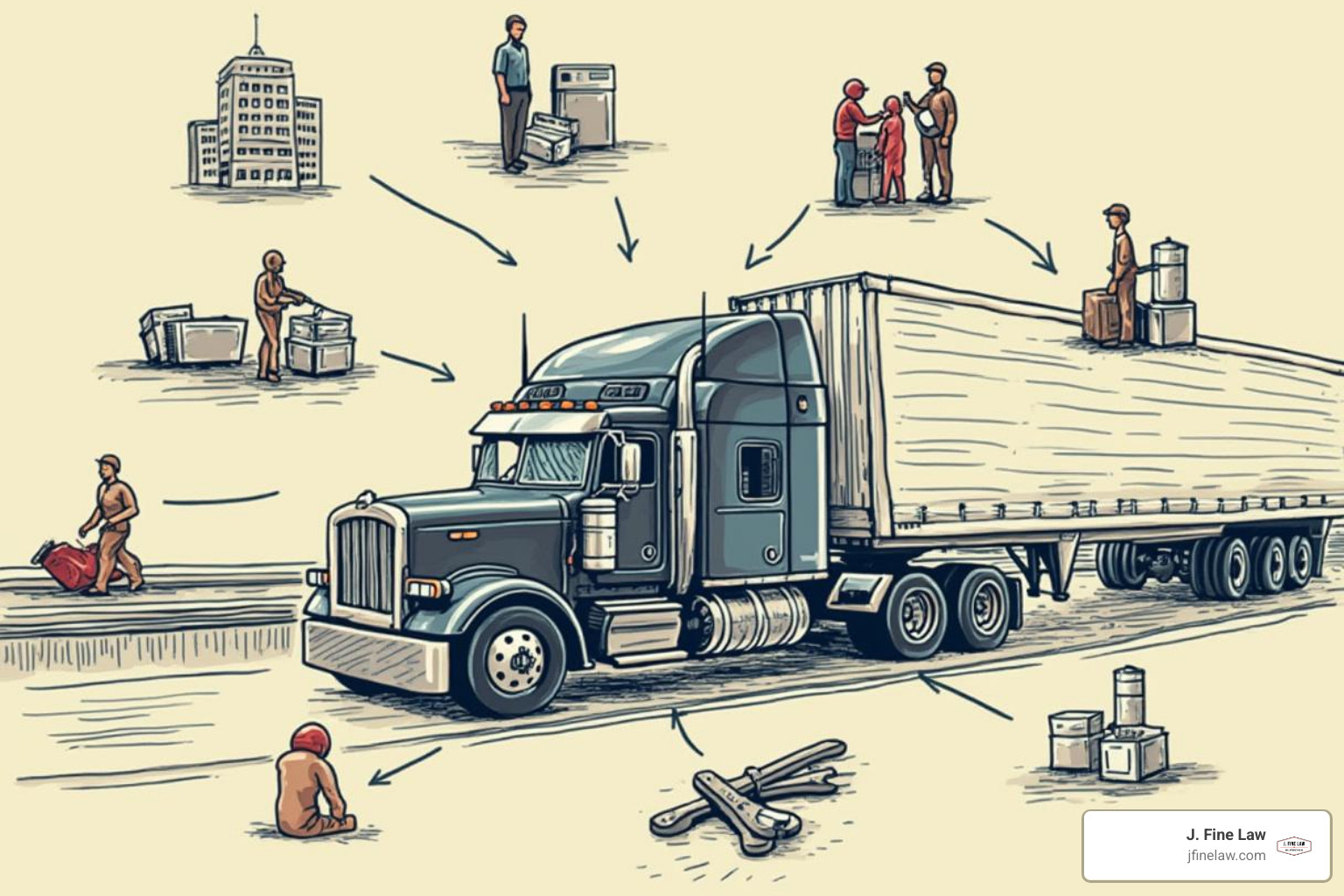Understanding Your Truck Accident Injury Lawsuit
When you’re involved in a truck accident injury lawsuit, you’re often facing serious challenges. These cases are rarely simple. They typically involve much more than just a car accident claim. Here’s a quick look at what they entail:
- What it is: A legal claim filed by a victim seeking compensation from responsible parties after a truck accident, especially when severe injuries or fatalities occur.
- Why it’s different: Truck accidents often lead to catastrophic injuries due to the sheer size difference between a commercial truck and a passenger vehicle. For instance, the average semi-truck can weigh around 40,000 lbs., while a car is about 5,000 lbs. Physics dictates that 97% of fatalities in fatal truck accidents are occupants of the passenger vehicle.
- Who can be liable: Unlike car accidents, multiple parties can be at fault, including the truck driver, the trucking company, manufacturers, or even cargo loaders.
- What’s at stake: Victims can seek compensation for extensive medical bills, lost wages, and severe pain and suffering, often involving significant financial burdens.
The aftermath of a truck accident can turn your life upside down. Medical bills pile up, and insurance companies start calling. You might feel overwhelmed, wondering how you’ll ever get fair compensation for your injuries, lost income, and future needs. That’s where legal help comes in.
Jason E. Fine, founder of J. Fine Law Group, P.C., has over 25 years of experience representing victims in motor vehicle accidents, including complex truck accident injury lawsuits. A ten-time Super Lawyer nominee, Jason consistently secures significant verdicts and settlements for his clients.
Key terms for truck accident injury lawsuit:
Why Truck Accident Cases Are More Complex
When a passenger car (≈5,000 lbs) meets a fully loaded tractor-trailer (up to 80,000 lbs), the smaller vehicle almost always loses. That weight gap explains why truck crashes leave victims facing catastrophic injuries, huge medical bills, and long-term care needs.
But size is only the beginning—several factors turn a truck accident injury lawsuit into a legal maze:
- Multiple Liable Parties – A single wreck can implicate a driver, the trucking company, a maintenance vendor, a cargo loader, a parts maker, or even a road agency.
- Common Accident Causes – Driver fatigue, poor maintenance, speeding, distracted or impaired driving, and overloaded or unsecured cargo routinely play a role. (See the FMCSA driver fatigue guidelines).
- Complex Federal Rules – Carriers must follow FMCSA regulations on driver hours, vehicle inspections, and cargo securement. Finding a violation is often the key to proving negligence.
- Unique Electronic Evidence – Black-box (ECM) data, Electronic Logging Devices (ELDs), and driver logs can pinpoint speed, braking, and hours of service.
- High Insurance Limits – Federal law requires most big-rigs to carry at least $750,000 in liability coverage, so the insurer has every incentive to fight hard.
Who Can Be Held Liable for a Truck Accident?
- Truck Driver – Speeding, texting, driving drowsy, or ignoring inspections.
- Trucking Company – Responsible under respondeat superior and separately liable for negligent hiring, training, supervision, or maintenance shortcuts.
- Parts or Vehicle Manufacturer – Defective brakes, tires, or steering components trigger product-liability claims.
- Cargo Loader / Broker – Unbalanced or loose freight can cause rollovers or jack-knifes.
- Maintenance Shop – Shoddy repairs or skipped service can make the truck unsafe.
- Government Entity – Rarely, an unsafe roadway or missing signage shares the blame.
Identifying every responsible party is critical to recovering full damages. Read more about liability here: More info about truck accident liability.
The Importance of a Swift Investigation
Trucking companies deploy rapid-response teams within hours. To stop evidence from disappearing, J. Fine Law immediately sends spoliation letters demanding preservation of:
- Black-box data (often overwritten in days)
- Driver logs & ELD records
- Maintenance files
- Scene evidence such as skid marks, debris, and eyewitness statements
A fast start lets us secure proof before it is lost—and gives your truck accident injury lawsuit the strongest foundation. Need help now? Get help from a Truck Injury Law Firm.
Navigating the Truck Accident Injury Lawsuit Process
1. Immediate Steps
- Get Medical Care – Even minor pain can mask serious harm; records also document your injuries.
- Call Police – The crash report captures driver info, insurance, and initial fault findings.
- Document the Scene – Photos, video, and witness contacts can make or break a claim.
2. Building Your Case
- We gather police reports, medical files, wage documentation, and the truck’s electronic data.
- Expert witnesses—accident reconstructionists, doctors, and economists—translate facts into proof of negligence and dollar amounts.
- A detailed demand letter goes to the carrier’s insurer to start settlement talks.
3. Settlement vs. Lawsuit—Pros & Cons
| Settle Early | File Suit | |
|---|---|---|
| Speed | Money sooner | Longer process |
| Stress | Minimal paperwork | Depositions & court dates |
| Value | Often lower | Potentially higher |
| Leverage | Limited findy | Forces full evidence exchange |
4. Lawsuit Timeline & Deadlines
Pennsylvania and New Jersey both give you two years from the crash date to sue. Missing that window usually ends your claim, so act quickly. Once filed, typical phases are:
- Findy – Written questions, document requests, and depositions.
- Mediation/Arbitration – A neutral third party tries to close the case.
- Trial – A judge or jury decides fault and damages if no agreement is reached.
More details: PA auto accidents | NJ auto accident claims
5. Elements We Must Prove
- Duty of Care – Defendant owed you safe conduct.
- Breach – They violated that duty (e.g., speeding, bad brakes).
- Causation – The breach caused your injuries.
- Damages – You suffered measurable losses.
Strong evidence on each point positions your truck accident injury lawsuit for success.
Understanding the Value of Your Claim: Damages and Settlements
Insurance companies move fast with low offers. Before you sign anything, understand all the losses you can claim.
Economic Damages (Easy to Count)
- Medical Bills – ER visits, surgery, rehab, future care.
- Lost Wages & Benefits – Past income plus reduced future earning power.
- Property Damage – Vehicle and personal items.
- Extra Costs – Travel to doctors, home modifications, in-home help.
Non-Economic Damages (Harder to See, Equally Real)
- Pain and Suffering – Physical and emotional toll, including PTSD.
- Loss of Enjoyment of Life – Missed hobbies, vacations, milestones.
- Loss of Consortium – Spouse or family’s loss of companionship.
Punitive Damages
Awarded only when conduct is grossly reckless—such as a carrier ordering illegal drive times.
How Settlements Are Calculated
- Add Economic Losses – We total every dollar spent or lost.
- Apply a Multiplier (1–5) – Reflects injury severity for pain and suffering.
- Adjust for Fault – Under modified comparative negligence, your award is reduced by your percentage of blame (51 % bar in PA, 50 % in NJ).
- Check Insurance Limits – Most rigs have at least $750k in coverage.
National averages run $500k–$1 M, but severe brain or spinal injuries can exceed $1 M. A personal injury settlement lawyer ensures every penny is documented. For fatal crashes, a Wrongful Death Lawyer helps families recover funeral costs, lost income, and emotional damages.
More background: Car Accident Compensation Claims.
Why You Need an Experienced Truck Accident Lawyer
Facing a trucking carrier’s legal team while you heal is daunting. An experienced attorney can level the playing field by leveraging their resources and knowledge on your behalf. Here are key reasons why professional legal help is crucial for a truck accident injury lawsuit:
- Deep Trucking Knowledge: A skilled lawyer understands the complex web of FMCSA regulations and can quickly identify violations related to driver hours, maintenance logs, and cargo securement.
- Rapid Evidence Preservation: Attorneys act immediately to send spoliation letters, demanding that trucking companies preserve critical evidence like black-box data, driver logs, and maintenance files before they are lost or destroyed.
- Proven Negotiation Skills: A Martindale/NOLO study found that represented victims receive settlements nearly 3.5 times larger than unrepresented claimants. An experienced lawyer knows how to counter lowball offers from aggressive insurance companies.
- Contingency-Fee Basis: Most top-tier personal injury firms work on contingency, meaning you pay no upfront costs and owe no attorney fees unless you win your case.
Questions to Ask Any Lawyer
- Have you handled truck accident cases like mine before?
- Are you prepared to take the case to trial if needed?
- Do you have the financial resources to hire necessary expert witnesses?
- Can you share client testimonials or past case results?
Choosing the right legal team is a critical step toward securing the compensation you deserve.
Frequently Asked Questions about Truck Accident Lawsuits
After a truck accident, it’s natural to have a lot of questions. We’re here to provide clear, straightforward answers to some of the most common concerns, helping you understand your rights and the path forward.
What are the most common causes of truck accidents?
When a large commercial truck is involved in an accident, it’s rarely due to just one factor. Often, a combination of issues leads to these devastating collisions. We frequently see accidents caused by driver fatigue, where truck drivers violate strict federal hours of service regulations and drive when they’re simply too tired.
Other significant causes include distracted driving, like using a cell phone behind the wheel, or speeding, especially when a truck exceeds the limit by 15 mph or more. We also tragically see accidents due to driving under the influence of alcohol or drugs.
Beyond driver behavior, issues with the truck itself can contribute. Improper cargo loading can make a truck unstable and prone to jackknifing or rollovers. And sadly, mechanical failures from poor maintenance, such as faulty brakes or tire blowouts, are also common culprits. Pinpointing these causes is a key part of building a strong truck accident injury lawsuit.
Can I still sue if I was partially at fault for the accident?
This is a great question, and the answer is often a resounding “Yes!” In states like Pennsylvania and New Jersey, where J. Fine Law operates, the law uses something called “modified comparative negligence.”
What this means is that you can still seek compensation even if you were partly responsible for the accident. The crucial detail is that your percentage of fault cannot be greater than the other party’s. In Pennsylvania, your fault must be 50% or less, while in New Jersey, it must be 50% or less.
If you are found partially at fault, your compensation will simply be reduced by that percentage. For example, if your damages total $100,000 and you are found 20% at fault, you would still receive $80,000. It’s always worth discussing your specific situation with an experienced legal team, as they can accurately assess your case.
How much does it cost to hire a truck accident lawyer?
We understand that after a serious accident, financial worries can be overwhelming. That’s why J. Fine Law, like most personal injury firms handling truck accident injury lawsuits, works on a contingency fee basis.
What does “contingency fee” mean for you? It’s simple: you pay absolutely no upfront fees. You don’t pay us anything out of your pocket to start your case. Our payment comes as a percentage of the final settlement or verdict we secure for you. In other words, we only get paid if we win your case.
This arrangement ensures that everyone, regardless of their current financial situation, has access to top-notch legal representation. It also means we are fully invested in securing the best possible outcome for you, because our success is directly tied to yours.
Take the First Step Towards Justice with J. Fine Law
If a truck accident has turned your life upside down, you don’t have to steer the path to recovery alone. A truck accident injury lawsuit is a complex legal battle with strict deadlines, and having an experienced advocate in your corner is essential.
At J. Fine Law, we are the experienced legal team you need. We provide the rapid response and deep trucking knowledge required to hold negligent parties accountable. Our proud track record includes a 98% success rate and over $50 million recovered for our clients across Pennsylvania and New Jersey. We handle every case on a contingency fee basis, so you pay nothing unless we win.
Let us take on the fight for your future so you can focus on healing.
Ready to talk? Contact our Cherry Hill, NJ personal injury lawyers for a free consultation today. We’re here to listen, answer your questions, and help you take that important first step.




